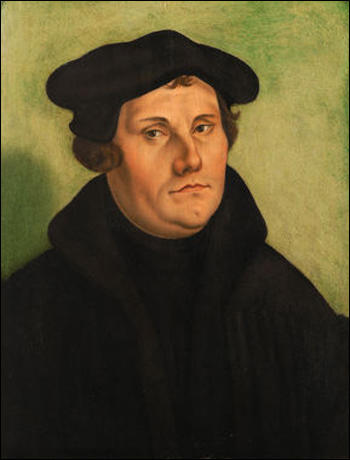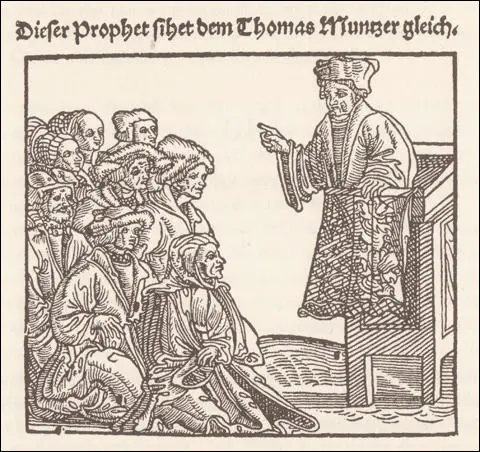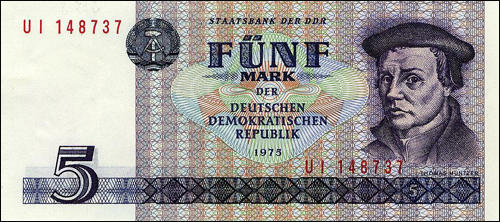Martin Luther and Thomas Müntzer
On 31st October, 1517, Martin Luther affixed to the castle church door, which served as the "black-board" of the university, on which all notices of disputations and high academic functions were displayed, his Ninety-five Theses. The same day he sent a copy of the Theses to the professors of the University of Mainz. They immediately agreed that they were "heretical". For example, Thesis 86, asks: "Why does not the pope, whose wealth today is greater than the wealth of the richest Crassus, build the basilica of St. Peter with his own money rather than with the money of poor believers?"
Pope Leo X ordered Luther to stop stirring up trouble. This attempt to keep Luther quiet had the opposite effect. Luther now started issuing statements about other issues. For example, at that time people believed that the Pope was infallible (incapable of error). However, Luther was convinced that Leo X was wrong to sell indulgences. Therefore, Luther argued, the Pope could not possibly be infallible.
Thomas Müntzer became a follower of Luther and in 1519 he spoke out against the Catholic Church. In 1523 Müntzer became a preacher in Allstedt. It was only a small town in the neighborhood of rich ore mines which produced a "restless class of miners always eager to promote social changes". Although the town only had a population of a few hundred it is claimed that his sermons were attended by as many as 2,000 people. Müntzer supported the miners in their attempts to form trade unions. This brought him into conflict with the authorities.
In March 1525, Müntzer succeeded in taking over the Mühlhausen town council and setting up a type of communistic society. By the spring of 1525 the rebellion, known as the Peasants’ War, had spread to much of central Germany. Although Martin Luther, agreed with many of the peasants' demands, he hated armed strife. He travelled round the country districts, risking his life to preach against violence.
Thomas Müntzer led about 8,000 peasants into battle in Frankenhausen on 15th May 1525. Müntzer told the peasants: "Forward, forward, while the iron is hot. Let your swords be ever warm with blood!" Armed with mostly scythes and flails they stood little chance against the well-armed soldiers of Philip I of Hesse and Duke George of Saxony. The combined infantry, cavalry and artillery attack resulted in the peasants fleeing in panic. Over 3,000 peasants were killed whereas only four of the soldiers lost their lives.
Primary Sources

(Source 2) Martin Luther, On the Pope as an Infallible Teacher (25 June 1520)
If we punish thieves with the yoke, highwaymen with the sword, and heretics with fire, why do we not rather assault these monsters of perdition, these cardinals, these popes, and the whole swarm of the Roman Sodom, who corrupt youth and the Church of God? Why do we not rather assault them with arms and wash our hands in their blood?
(Source 3) Martin Luther, An Earnest Exhortation for all Christians, Warning Them Against Insurrection and Rebellion (December 1521)
Now it seems probable that there is danger of an insurrection, and that priests, monks, bishops, and the entire spiritual estate may be murdered or driven into exile, unless they seriously and thoroughly reform themselves. For the common man... is neither able nor willing to endure it longer, and would indeed have good reason to lay about him with flails and cudgels, as the peasants are threatening to do.
(Source 4) Henry Ganss, The Catholic Encyclopedia (1910)
The peasant outbreaks, which in milder forms were previously easily controlled, now assumed a magnitude and acuteness that threatened the national life of Germany.... A fire of repressed rebellion and infectious unrest burned throughout the nation. This smouldering fire Luther fanned to a fierce flame by his turbulent and incendiary writings, which were read with avidity by all, and by none more voraciously than the peasant, who looked upon 'the son of a peasant' not only as an emancipator from Roman impositions, but the precursor of social advancement.
(Source 5) Frederick Engels, The German Peasants' War (1850)
By the kingdom of God Müntzer meant a society with no class differences, no private property and no state authority independent of, and foreign to, members of society.
(Source 6) Thomas Müntzer, speech (August, 1524)
The worst of all the ills on Earth is that no-one wants to concern themselves with the poor. The rich do as they wish... Our lords and princes encourage theft and robbery. The fish in the water, the birds in the sky, and the vegetation on the land all have to be theirs... They... preach to the poor: 'God has commanded that thou shalt not steal'. Thus, when the poor man takes even the slightest thing he has to hang.
(Source 7) Jasper Ridley, Henry VIII (1984)
All the sovereigns of Europe supported the Pope against Luther. The Kings had often quarrelled with the Popes about money and foreign policy; but a popular movement which attacked Papal authority was a seditious threat to the social order of Christendom which could soon lead to revolutionary attacks on the authority of Kings and on the privileges and property of the nobility and the wealthy classes... The outbreak of the Peasant War in Germany in 1525... made Henry VIII, like his brother Kings, a determined enemy of Lutheranism.
(Source 8) Ernest Belfort Bax, The Peasants War in Germany (1987)
Münzer marched with his men to the elevation above Frankenhausen, called to this day the Schlachtberg. The negotiations entered into by the princes had had a demoralising effect upon the peasant army. A full amnesty was promised if they would only hand over their leaders, among whom Münzer was specially singled out. The noblemen who had been forced to join the peasants were naturally the most zealous advocates of surrender...
Suddenly the cannon of the princes thundered into the camp. Many looked upwards, says a contemporary manuscript quoted by Zimmermann, to behold whether help would not come from heaven. But before the legions of angels descended, the waggon-stockade was broken through, and “they were shot, pierced and miserably slain”. In a few minutes the peasant army was dispersed and in full flight in various directions. A small body held its own for a short time in a stone quarry, only to be ultimately overpowered.
(Source 9) Owen Chadwick, The Reformation (1964)
Luther had been born a peasant and knew the wretchedness of the peasants. He had hit hard at the oppression of the landlords and agreed and many of the peasants' demands. But he hated armed strife. The way of peaceable and insistent demand he believed to be the only Christian way. When the revolt began he travelled round the country districts, risking his life to preach against violence.
(Source 10) Derek Wilson, Out of the Storm: The Life and Legacy of Martin Luther (2007)
There was nothing new about peasant unrest. The inequalities of society bore down on the rural working population and at any time a local dispute could spark the firedamp of resentment and frustration with perceived or actual injustices. What marked this uprising out as different - apart from its geographical extent - was the evangelical standard hoisted by several of the peasant groups....
Luther told the peasants... the rebels have no mandate from God to challenge their masters and, as Jesus had shown by his rebuking of Peter who had drawn the sword in the Garden of Gethsemane, violence was never an option for the Christian. Vengeance and the rightings of wrongs belonged to God...
Luther went through their twelve demands. The abolition of serfdom was fanciful nonsense; equality under the Gospel does not translate into the removal of social grading. Without class distinctions society would disintegrate into anarchy. By the same token, the withholding of tithes would be an unwarranted attack on the economic working of the prevailing system.

(Source 12) Martin Luther, An Admonition to Peace: A Reply to the Twelve Articles of the Peasants in Swabia (May 1525)
To the Princes and Lords... We have no one on earth to thank for this mischievous rebellion, except you princes and lords; and especially you blind bishops and mad priests and monks... since you are the cause of this wrath of God, it will undoubtedly come upon you, if you do not mend your ways in time. ... The peasants are mustering, and this must result in the ruin, destruction, and desolation of Germany by cruel murder and bloodshed, unless God shall be moved by our repentance to prevent it...
If these peasants do not do it for you, others will... It is not the peasants, dear lords, who are resisting you; it is God Himself. ... To make your sin still greater, and ensure your merciless destruction, some of you are beginning to blame this affair on the Gospel and say it is the fruit of my teaching... You did not want to know what I taught, and what the Gospel is; now there is one at the door who will soon teach you, unless you amend your ways.
(Source 13) Martin Luther, Against the Murdering Thieving Hordes of Peasants (1525)
The pretences which they made in their twelve articles, under the name of the Gospel, were nothing but lies. It is the devil's work that they are at.... They have abundantly merited death in body and soul. In the first place they have sworn to be true and faithful, submissive and obedient, to their rulers, as Christ commands... Because they are breaking this obedience, and are setting themselves against the higher powers, willfully and with violence, they have forfeited body and soul, as faithless, perjured, lying, disobedient knaves and scoundrels are wont to do...
They are starting a rebellion, and violently robbing and plundering monasteries and castles which are not theirs, by which they have a second time deserved death in body and soul, if only as highwaymen and murderers ... if a man is an open rebel every man is his judge and executioner, just as when a fire starts, the first to put it out is the best man.
For rebellion is not simple murder, but is like a great fire, which attacks and lays waste a whole land. Thus rebellion brings with it a land full of murder and bloodshed, makes widows and orphans, and turns everything upside down, like the greatest disaster. Therefore let everyone who can, smite, slay, and stab, secretly or openly, remembering that nothing can be more poisonous, hurtful, or devilish than a rebel. It is just as when one must kill a mad dog; if you do not strike him, he will strike you, and a whole land with you...
I will not oppose a ruler who, even though he does not tolerate the Gospel, will smite and punish these peasants without offering to submit the case to judgment... If anyone thinks this too hard, let him remember that rebellion is intolerable and that the destruction of the world is to be expected every hour.

(Source 15) Martin Luther, letter of Nicolaus von Amsdorf (25 May 1525)
My opinion is that it is better that all the peasants be killed than that the princes and magistrates perish, because the rustics took the sword without divine authority. The only possible consequence of their satanic wickedness would be the diabolic devastation of the kingdom of God. Even if the princes abuse their power, yet they have it of God, and under their rule the kingdom of God at least has a chance to exist. Wherefore no pity, no tolerance should be shown to the peasants, but the fury and wrath of God should be visited upon those men who did not heed warning nor yield when just terms were offered them, but continued with satanic fury to confound everything... To justify, pity, or favor them is to deny, blaspheme, and try to pull God from heaven.
(Source 16) Martin Luther, An Open Letter Against the Peasants (July 1525)
All my words were against the obdurate, hardened, blinded peasants, who would neither see nor hear, as anyone may see who reads them; and yet you say that I advocate the slaughter of the poor captured peasants without mercy.... On the obstinate, hardened, blinded peasants, let no one have mercy.
They say... that the lords are misusing their sword and slaying too cruelly. I answer: What has that to do with my book? Why lay others' guilt on me? If they are misusing their power, they have not learned it from me; and they will have their reward ...
See, then, whether I was not right when I said, in my little book, that we ought to slay the rebels without any mercy. I did not teach, however, that mercy ought not to be shown to the captives and those who have surrendered.
Questions for Students
Question 1: Read sources 2, 3 and 4. Explain Martin Luther's views on using violence to achieve religious and political change.
Question 2: What kind of society did Thomas Müntzer want? It will help you to read sources 5 and 6.
Question 3: According to source 7, why did Henry VIII become opposed to Lutherism in 1525.
Question 4: Read the introduction and source 8 and then explain why Thomas Müntzer's army was defeated at Frankenhausen.
Question 5. Study sources 11 and 14. Do you think the producers of these sources were critical of Thomas Müntzer.
Question 6: Martin Luther argued in favour of the demands being made by the peasants in 1520. Select information from the sources to explain why he did not support the Peasants' Revolt in 1525.
Answer Commentary
A commentary on these questions can be found here
